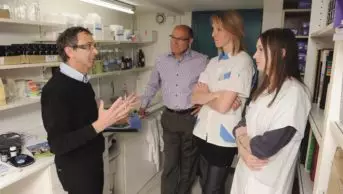
Shutterstock.com
Twenty years ago, a chief pharmacist with a management qualification would have been the exception rather than the rule. A pharmacist aspiring to a career in management would focus on clinical pharmacy and be promoted upwards, learning the skills they needed on the job.
This was the experience of Alison Ewing, clinical director of pharmacy and therapies at Royal Liverpool and Broadgreen University Hospitals NHS Trust and vice chairman of the Institute of Pharmacy Management International. “I have absolutely no management training at all,” she admits, “you learn from your mistakes doing it the way I did.”
Management now
Nowadays things have changed dramatically and some form of management qualification is essential to be a serious contender for a senior post, says Richard Cattell, chief operations officer at Walsall NHS Healthcare Trust. He explains that an MBA is not required, but it is important to have a postgraduate qualification or masters diploma in some form of management: “If you were going to get into a senior management job, whether that’s pharmacy management or outside of pharmacy, you’d need some badge that shows you have given the matter a bit of thought.”
Unfortunately, a popular national development scheme for senior pharmacists, the Morpeth course, is no longer on offer. However, options for future managers now include ‘lead or be led’ and ‘aspiring directors’ courses, and the NHS’s Leadership Academy.
Why become a manager?
But, before embarking on any training, it is important to ensure you want to be a manager and have the drive to do it. Ask pharmacy managers what drove them down that path and some might mention the variety of work and the remuneration, but most will say they wanted to influence and shape the direction of pharmacy.
“You start off in a junior pharmacist’s role and think, ‘if I were in charge of all clinical services then I would organise it differently’,” explains Cattell, who is a pharmacist by background. “You move up into that role and think, ‘if I were in charge of the whole department…’”
Martin Stephens, chief executive of Wessex Academic Health Science Network, says that a senior leadership role in hospital pharmacy is a fantastic opportunity to shape services through your team. He explains that any achievement is attributed to the whole team, so “you do have to be prepared to bask in the reflected glory,” he warns. “But if you can get your satisfaction that way, nothing is more rewarding.”
Stephens, who was formerly national clinical director for hospital pharmacy at the Department of Health, advises pharmacists to talk to several managers, good and bad, within pharmacy and outside it, and from several organisations. “Talk to people who have done the job you’re aspiring to do,” he says. He suggests finding appropriate role models and, if possible, asking for some mentoring and coaching, particularly during intermediate leadership roles, such as a specialist pharmacist, at NHS pay bands 8a (£39,239–£47,088) and 8b (£45,707–£56,504).
Drawbacks to management
Stephens highlights that anyone embarking on management should also ask themselves first whether they are prepared do far less hands-on clinical work and have little, if any, direct patient contact.
Ewing has not dispensed a prescription for 15 years and admits that she still misses patients. “The times that I go to the wards and have a chat with them, I just remember how much I loved it and why I went into pharmacy.” Her job satisfaction now comes from seeing improvements in patient care, and through staff development.
Paul Skipper has been assistant director of pharmacy (clinical and medicines management) at Liverpool and Broadgreen NHS Trust since 2012 and opts to still do some clinical work. “As a clinical pharmacist you tend to be concerned about the one patient that is in front of you and doing absolutely everything for that patient,” he says. “One of the benefits of the management role — it could be seen as negative as well — is you have to take that step back and see what you can do to benefit the whole of pharmacy. You are looking at the bigger picture, but I think that means you are actively involved in shaping the services that you are providing patients and hopefully making them better.”
He advises anyone considering senior management to make sure they really want it and will suit it. “There can be pressures, so can you be calm under that pressure? Do you know where you want to take services? Do you have a strategy? Do you have a vision? When things are tight, you have to be optimistic and confident that you can pull the team through to realise those.”
Ewing agrees. “You have to be broadminded, have to have broad shoulders and have to be determined not to let things grind you down because there are days when it’s dreadful,” she says. “It’s a lonely, lonely job. That’s why the network of chief pharmacists is so important.”
Committing to management
Those who feel they have what it takes should aim to gain well-rounded clinical as well as management experience, Skipper says. They should also identify and acquire the specific skills they will need in particular roles.
Cattell also emphasises the importance of identifying and pursuing any necessary skills. He decided in the late 1990s that he wanted to be a chief pharmacist but realised he lacked some of the required skills. A role came up running the NHS South West medicines information and training unit at Bristol Royal Infirmary, where he would be responsible for staff and the budget. As well as gaining experience in these areas, he completed a Masters qualification in management and leadership as part of his development programme. This formalised a lot of what he had already learnt and introduced him to strategy, operational management and human resources. “That has been the foundation for all of my management since then,” he says.
Skipper himself is planning to complete an MBA. While not every pharmacy manager requires this qualification, for those with aspirations to run bigger departments or move up to board level he thinks it helps. “It’s a known qualification, and you have a certain knowledge base that people can be confident you would apply.”
“Horizon scanning”, a management term referring to being aware of potential opportunities and future developments, is also really important for seeking out management opportunities, and making sure you are part of a national network enables you to do that much better, Cattell says. He got involved in professional leadership through the Guild of Healthcare Pharmacists, of which he was president in 2008–2009.
Working within hospital pharmacy…
Pharmacists who thrive on direct interaction with patients and want to maintain a large clinical commitment could consider becoming a consultant pharmacist, which is an equally important leadership role but does not involve leading the whole service, Stephens says. And deciding to focus on clinical pharmacy does not rule out wider leadership opportunities, he adds. There are opportunities to take on leadership roles outside of the traditional service manager posts, such as in projects, transformational change, and committees and working groups both within and outside the hospital.
…And out of it
A career in management can ultimately take you outside of the hospital pharmacy environment. For Cattell, this has meant a general manager hospital role, and for Stephens, a pharmacy role but on the national stage.
Cattell was made chief pharmacist at the Dudley Group of Hospitals NHS Foundation Trust in 2007, and in 2008 his role was widened to clinical director for clinical support services, where he was responsible for ensuring that 16 non-pharmacy services, ranging from therapy to chaplaincy, met their performance and finance targets. In 2009, his role was expanded again to deputy operations director, and in April 2013 he hung up his pharmacy hat and became full-time director of operations at the Dudley, before moving to Walsall in September 2014.
Why did Cattell leave pharmacy? “I am somebody who thrives on new things, new situations, building networks and relationships and working across services and across organisations,” he says.
But the skills he learned in pharmacy have proved useful in general management, he emphasises. His academic background helps him to assimilate data and information and make decisions as an executive director. And pharmacy’s focus on quality of care, safe cultures and practices, and understanding process failures and incidents has proved invaluable.
As a general manager, a pharmacy background also helps him work with other clinicians, Cattell says. “They can’t use long medical words to try and baffle me. I also know from being a pharmacist on the wards how ward teams work, the traditional tensions between different professions and the language different professionals like to use.”
While Cattell enjoys his new role, he does miss being the “go-to person” on the way medicines are used in the organisation. “I am stepping away from being the subject matter expert on medicines to being a subject matter expert in how you run a hospital.”
Stephens was national clinical director for hospital pharmacy at the Department of Health for three years (2008–2011). He advises pharmacists aiming for a regional or national job to get involved with projects outside of their usual remit and organisation, ideally at regional level, to gain an understanding of the wider healthcare and the political landscape. He did this by working with the workforce development board, and then he was invited to join some Department of Health working groups. According to Stephens, contributing at conferences and other training events beyond your immediate organisation is another way of testing whether you can deliver on a broader stage.


